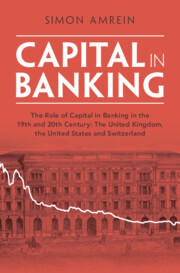Refine search
Actions for selected content:
26946 results in Economic history
Figures
-
- Book:
- Money, Value, and the State
- Published online:
- 05 December 2024
- Print publication:
- 12 December 2024, pp viii-ix
-
- Chapter
- Export citation
4 - Crimes against Economy
-
- Book:
- Money, Value, and the State
- Published online:
- 05 December 2024
- Print publication:
- 12 December 2024, pp 211-262
-
- Chapter
- Export citation
Archival Collections Consulted
-
- Book:
- Money, Value, and the State
- Published online:
- 05 December 2024
- Print publication:
- 12 December 2024, pp 327-328
-
- Chapter
- Export citation
A Note on the Text
-
- Book:
- Money, Value, and the State
- Published online:
- 05 December 2024
- Print publication:
- 12 December 2024, pp xv-xvi
-
- Chapter
- Export citation
Introduction
-
- Book:
- Money, Value, and the State
- Published online:
- 05 December 2024
- Print publication:
- 12 December 2024, pp 1-50
-
- Chapter
-
- You have access
- HTML
- Export citation
5 - Magendo
-
- Book:
- Money, Value, and the State
- Published online:
- 05 December 2024
- Print publication:
- 12 December 2024, pp 263-303
-
- Chapter
- Export citation
2 - A Monopoly on Valuation
-
- Book:
- Money, Value, and the State
- Published online:
- 05 December 2024
- Print publication:
- 12 December 2024, pp 92-147
-
- Chapter
- Export citation
3 - Restricted Value
-
- Book:
- Money, Value, and the State
- Published online:
- 05 December 2024
- Print publication:
- 12 December 2024, pp 148-210
-
- Chapter
- Export citation
Copyright page
-
- Book:
- Money, Value, and the State
- Published online:
- 05 December 2024
- Print publication:
- 12 December 2024, pp iv-iv
-
- Chapter
- Export citation
Contents
-
- Book:
- Money, Value, and the State
- Published online:
- 05 December 2024
- Print publication:
- 12 December 2024, pp vii-vii
-
- Chapter
- Export citation
Dedication
-
- Book:
- Money, Value, and the State
- Published online:
- 05 December 2024
- Print publication:
- 12 December 2024, pp v-vi
-
- Chapter
- Export citation

Capital in Banking
- The Role of Capital in Banking in the 19th and 20th Century: The United Kingdom, the United States and Switzerland
-
- Published online:
- 09 December 2024
- Print publication:
- 23 January 2025
-
- Book
-
- You have access
- Open access
- Export citation

Money, Value, and the State
- Sovereignty and Citizenship in East Africa
-
- Published online:
- 05 December 2024
- Print publication:
- 12 December 2024
8 - The Socialist Rust Belt in the Market Economy
- from Part III - Socialisms with Chinese Characteristics, 1957–2000
-
- Book:
- Making Mao's Steelworks
- Published online:
- 19 December 2024
- Print publication:
- 05 December 2024, pp 265-293
-
- Chapter
- Export citation
Bibliography
-
- Book:
- Plebeian Consumers
- Published online:
- 18 December 2024
- Print publication:
- 05 December 2024, pp 225-250
-
- Chapter
- Export citation
Index
-
- Book:
- Making Mao's Steelworks
- Published online:
- 19 December 2024
- Print publication:
- 05 December 2024, pp 343-356
-
- Chapter
- Export citation
Introduction
-
- Book:
- Plebeian Consumers
- Published online:
- 18 December 2024
- Print publication:
- 05 December 2024, pp 1-22
-
- Chapter
- Export citation
5 - Books, Hats, and “Foreign” Coats
-
- Book:
- Plebeian Consumers
- Published online:
- 18 December 2024
- Print publication:
- 05 December 2024, pp 151-177
-
- Chapter
- Export citation
1 - Consumers, Citizens, and the Republican Project
-
- Book:
- Plebeian Consumers
- Published online:
- 18 December 2024
- Print publication:
- 05 December 2024, pp 23-51
-
- Chapter
- Export citation
Part III - Socialisms with Chinese Characteristics, 1957–2000
-
- Book:
- Making Mao's Steelworks
- Published online:
- 19 December 2024
- Print publication:
- 05 December 2024, pp 227-293
-
- Chapter
- Export citation
